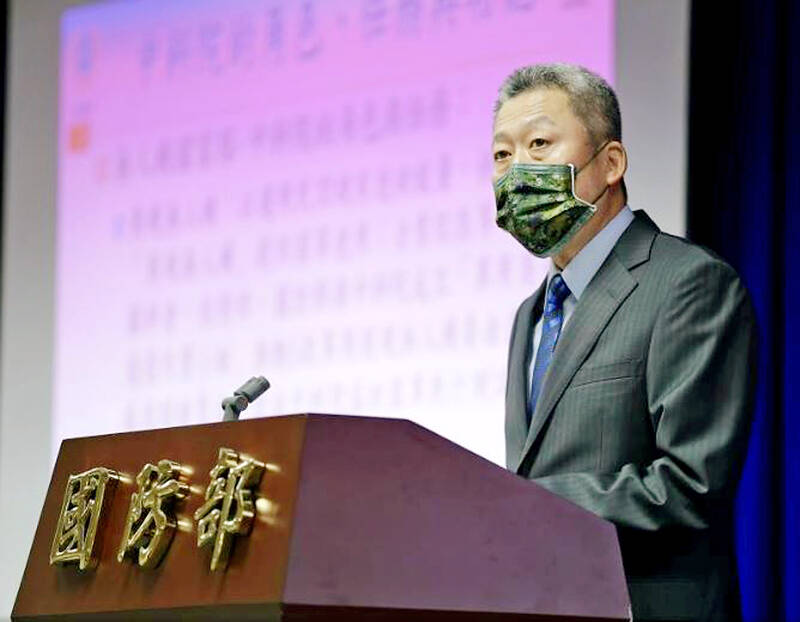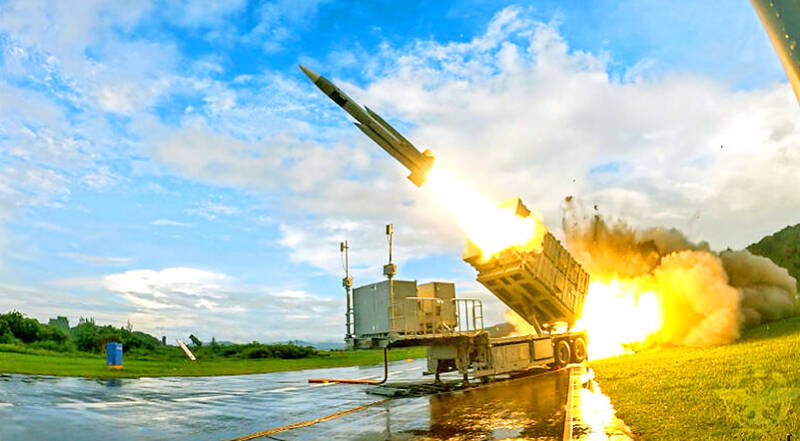The Chungshan Institute of Science and Technology yesterday said it is working with the private sector to develop uncrewed aerial vehicles (UAVs) for military use with the aim of building a drone fleet next year.
Chi Li-pin (齊立平), head of the institute’s Aeronautical Systems Research Division, said the goal is to build prototypes of five kinds of commercial drones customized for military purposes: carrier-launched drones, land-based surveillance drones, other surveillance drones, miniature drones and drones with target-acquisition capabilities.
The reason for using commercial platforms is to have them available for basic non-combat surveillance more quickly, Chi said.

Photo courtesy of the Military News Agency
Developing military-grade UAVs is a lengthy process that can take four to five years due to the military’s requirements, but commercial-grade drones can pass tests and be ready for military surveillance missions in about a year, he said.
The prototypes are expected to be delivered to the institute by July 31, as scheduled, he added.
The institute would be responsible for testing the drones and helping private manufacturers navigate the process, Chi said.

Photo courtesy of the Ministry of National Defense
Mass production could begin as soon as next year, once the drones pass the required tests, he said.
To ensure national security, the institute has required the partner companies to prove that they are not funded by firms based in China and that they do not have shares in China-based enterprises, Chi said.
They also pledged not to use products or components manufactured in China or by Chinese firms, he said.
Separately, a senior official familiar with the matter said on condition of anonymity that the institute is ramping up efforts to produce missiles with the goal of reaching maximum production volume no later than the end of next year.
This year’s production target of 1,000 missiles of all types represents a substantial increase over the 800 missiles produced last year, they said, adding that the institute’s 16 missile assembly lines are fully operational.
The missile assembly lines used to be semi-manual, which was a significant constraint on mass production, but the situation has improved following the opening of new factories, they added.
Additional reporting by Lo Tien-pin

CHAOS: Iranians took to the streets playing celebratory music after reports of Khamenei’s death on Saturday, while mourners also gathered in Tehran yesterday Iranian Supreme Leader Ayatollah Ali Khamenei was killed in a major attack on Iran launched by Israel and the US, throwing the future of the Islamic republic into doubt and raising the risk of regional instability. Iranian state television and the state-run IRNA news agency announced the 86-year-old’s death early yesterday. US President Donald Trump said it gave Iranians their “greatest chance” to “take back” their country. The announcements came after a joint US and Israeli aerial bombardment that targeted Iranian military and governmental sites. Trump said the “heavy and pinpoint bombing” would continue through the week or as long

TRUST: The KMT said it respected the US’ timing and considerations, and hoped it would continue to honor its commitments to helping Taiwan bolster its defenses and deterrence US President Donald Trump is delaying a multibillion-dollar arms sale to Taiwan to ensure his visit to Beijing is successful, a New York Times report said. The weapons sales package has stalled in the US Department of State, the report said, citing US officials it did not identify. The White House has told agencies not to push forward ahead of Trump’s meeting with Chinese President Xi Jinping (習近平), it said. The two last month held a phone call to discuss trade and geopolitical flashpoints ahead of the summit. Xi raised the Taiwan issue and urged the US to handle arms sales to

BIG SPENDERS: Foreign investors bought the most Taiwan equities since 2005, signaling confidence that an AI boom would continue to benefit chipmakers Taiwan Semiconductor Manufacturing Co’s (TSMC, 台積電) market capitalization swelled to US$2 trillion for the first time following a 4.25 percent rally in its American depositary receipts (ADR) overnight, putting the world’s biggest contract chipmaker sixth on the list of the world’s biggest companies by market capitalization, just behind Amazon.com Inc. The site CompaniesMarketcap.com ranked TSMC ahead of Saudi Aramco and Meta Platforms Inc. The Taiwanese company’s ADRs on Tuesday surged to US$385.75 on the New York Stock Exchange, as strong demand for artificial intelligence (AI) applications led to chip supply constraints and boost revenue growth to record-breaking levels. Each TSMC ADR represents

State-run CPC Corp, Taiwan (CPC, 台灣中油) yesterday said that it had confirmed on Saturday night with its liquefied natural gas (LNG) and crude oil suppliers that shipments are proceeding as scheduled and that domestic supplies remain unaffected. The CPC yesterday announced the gasoline and diesel prices will rise by NT$0.2 and NT$0.4 per liter, respectively, starting Monday, citing Middle East tensions and blizzards in the eastern United States. CPC also iterated it has been reducing the proportion of crude oil imports from the Middle East and diversifying its supply sources in the past few years in response to geopolitical risks, expanding